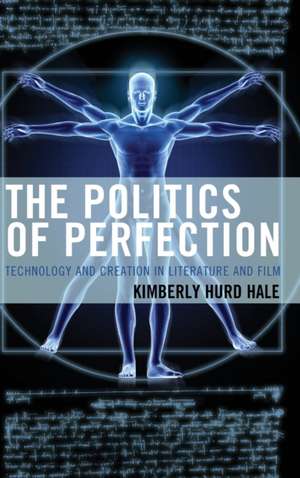Politics of Perfection: Politics, Literature, & Film
Autor Kimberly Hurd Haleen Limba Engleză Hardback – 19 oct 2016
The Politics of Perfection: Technology and Creation in Literature and Film provides an exploration of the relationship between modern technological progress and classical liberalism. Each chapter provides a detailed analysis of a film or novel, including Fritz Lang s Metropolis, Ridley Scott s Prometheus, Michael Gondry s Eternal Sunshine of the Spotless Mind, Kazuo Ishiguro s Never Let Me Go, and Margaret Atwood s Oryx and Crake. These works of fiction are examined through the lens of political thinkers ranging from Plato to Hannah Arendt. The compatibility of classical liberalism and technology is questioned, using fiction as a window into Western society s views on politics, economics, religion, technology, and the family. This project explores the intersection between human nature and creation, particularly artificial intelligence and genetic engineering, using works of literature and film to access cultural concerns. Each of the works featured asks a question about the relationship between technology and creation. Technology also allows humanity to create new types of life in the forms of artificial intelligence and genetically engineered beings. This book studies works of literature and film as evidence of the contemporary unease with the progress of technology and its effect on the political realm."
Din seria Politics, Literature, & Film
- 19%
 Preț: 613.37 lei
Preț: 613.37 lei - 23%
 Preț: 649.97 lei
Preț: 649.97 lei - 23%
 Preț: 648.80 lei
Preț: 648.80 lei -
 Preț: 348.60 lei
Preț: 348.60 lei - 23%
 Preț: 650.27 lei
Preț: 650.27 lei - 23%
 Preț: 688.79 lei
Preț: 688.79 lei -
 Preț: 408.51 lei
Preț: 408.51 lei - 27%
 Preț: 683.78 lei
Preț: 683.78 lei - 23%
 Preț: 649.54 lei
Preț: 649.54 lei -
 Preț: 353.98 lei
Preț: 353.98 lei - 23%
 Preț: 648.50 lei
Preț: 648.50 lei - 27%
 Preț: 677.84 lei
Preț: 677.84 lei - 23%
 Preț: 686.27 lei
Preț: 686.27 lei - 27%
 Preț: 817.30 lei
Preț: 817.30 lei - 23%
 Preț: 613.07 lei
Preț: 613.07 lei -
 Preț: 366.40 lei
Preț: 366.40 lei -
 Preț: 375.53 lei
Preț: 375.53 lei - 23%
 Preț: 650.27 lei
Preț: 650.27 lei - 23%
 Preț: 561.15 lei
Preț: 561.15 lei - 23%
 Preț: 646.71 lei
Preț: 646.71 lei - 27%
 Preț: 715.70 lei
Preț: 715.70 lei - 23%
 Preț: 683.62 lei
Preț: 683.62 lei - 23%
 Preț: 651.78 lei
Preț: 651.78 lei - 23%
 Preț: 649.09 lei
Preț: 649.09 lei - 23%
 Preț: 685.56 lei
Preț: 685.56 lei - 23%
 Preț: 649.68 lei
Preț: 649.68 lei -
 Preț: 416.33 lei
Preț: 416.33 lei -
 Preț: 398.25 lei
Preț: 398.25 lei - 23%
 Preț: 635.64 lei
Preț: 635.64 lei - 23%
 Preț: 687.15 lei
Preț: 687.15 lei - 23%
 Preț: 649.97 lei
Preț: 649.97 lei - 23%
 Preț: 684.35 lei
Preț: 684.35 lei -
 Preț: 342.35 lei
Preț: 342.35 lei - 23%
 Preț: 606.81 lei
Preț: 606.81 lei -
 Preț: 368.40 lei
Preț: 368.40 lei - 23%
 Preț: 648.05 lei
Preț: 648.05 lei -
 Preț: 372.05 lei
Preț: 372.05 lei -
 Preț: 361.79 lei
Preț: 361.79 lei - 27%
 Preț: 680.66 lei
Preț: 680.66 lei - 23%
 Preț: 683.76 lei
Preț: 683.76 lei -
 Preț: 352.02 lei
Preț: 352.02 lei - 23%
 Preț: 690.29 lei
Preț: 690.29 lei - 23%
 Preț: 687.91 lei
Preț: 687.91 lei - 23%
 Preț: 686.57 lei
Preț: 686.57 lei -
 Preț: 415.76 lei
Preț: 415.76 lei - 23%
 Preț: 660.66 lei
Preț: 660.66 lei
Preț: 601.13 lei
Preț vechi: 780.68 lei
-23% Nou
115.04€ • 124.92$ • 96.63£
Carte tipărită la comandă
Livrare economică 22 aprilie-06 mai
Specificații
ISBN-10: 1498509924
Pagini: 162
Dimensiuni: 159 x 241 x 22 mm
Greutate: 0.36 kg
Editura: Rowman & Littlefield
Seria Politics, Literature, & Film
